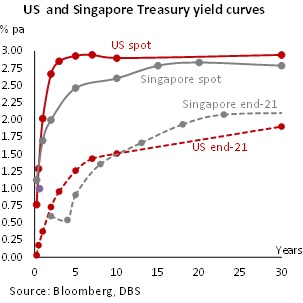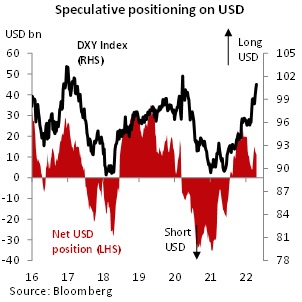- Banking
- Wealth
- Privileges
- NRI Banking
- Treasures Private Client
- Equity and bond markets have sold off, credit spreads have widened
- Cost of funding has gone up, several EM economies have fallen into balance of payments crises
- Yield curves have shifted up substantially, flattening along the way
- We foresee companies and individuals cutting back on consumption and investment
- North and East Asia may have buffers to deal with the rate hike cycle, but going will be tough
Related Insights

Commentary: Mounting market stress
Rising rates amid high inflation and various points of stress, including the war in Ukraine and China’s pandemic struggles, have pushed global markets in a risky zone. Already, equity and bond markets have sold off, credit spreads have widened, cost of funding has gone up, several emerging market economies have fallen into balance of payments crises, and currencies have turned volatile. Yield curves have shifted up substantially, flattening along the way, reflecting nervousness about the outlook.
Looking at the US and Singapore long-term government bond yields, near doubling of yields in the span of just four months is dramatic and potentially disruptive for market pricing of financial products, including mortgages. As firms and individuals consider the substantially higher cost of borrowing for at least the next year or two, their consumption and investment decisions are likely to be impacted profoundly. The higher yields in the public debt space are spilling over into the private sector, especially in the pricing of credit risk in the emerging markets. 
Having gotten used to long-term negative real interest rates and ample liquidity, markets are struggling to adjust to the fast-changing reality where the opposite is the case. The prospect of large interest rate increases in the US have caused the greenback to soar, causing sharp depreciation in both DM (Yen down 20%ytd, Euro, 12%) and EM (Korea Won down 13%, baht 12%) currencies. For companies that have USD payables, whether in the form interest payments or import bill for inputs, the cost increase, and resulting margin compression, would be substantial. 
From the early 1980s debt crisis to the 1997 Asian financial crisis, emerging markets have seldom fared well around a pronounced US rate hike cycle. We remain confident that North and East Asian economies are largely capable of handling the forthcoming shock, but the stress is mounting in parts of South Asia, Eastern Europe, Middle East, Africa, and the Americas. In a world with a great deal of turbulence, the waves of financial market stress are bound to disturb even the most tranquil shore.
To read the full report, click here to Download the PDF.
Subscribe here to receive our economics & macro strategy materials.
To unsubscribe, please click here.
Topic
The information herein is published by DBS Bank Ltd and/or DBS Bank (Hong Kong) Limited (each and/or collectively, the “Company”). This report is intended for “Accredited Investors” and “Institutional Investors” (defined under the Financial Advisers Act and Securities and Futures Act of Singapore, and their subsidiary legislation), as well as “Professional Investors” (defined under the Securities and Futures Ordinance of Hong Kong) only. It is based on information obtained from sources believed to be reliable, but the Company does not make any representation or warranty, express or implied, as to its accuracy, completeness, timeliness or correctness for any particular purpose. Opinions expressed are subject to change without notice. This research is prepared for general circulation. Any recommendation contained herein does not have regard to the specific investment objectives, financial situation and the particular needs of any specific addressee. The information herein is published for the information of addressees only and is not to be taken in substitution for the exercise of judgement by addressees, who should obtain separate legal or financial advice. The Company, or any of its related companies or any individuals connected with the group accepts no liability for any direct, special, indirect, consequential, incidental damages or any other loss or damages of any kind arising from any use of the information herein (including any error, omission or misstatement herein, negligent or otherwise) or further communication thereof, even if the Company or any other person has been advised of the possibility thereof. The information herein is not to be construed as an offer or a solicitation of an offer to buy or sell any securities, futures, options or other financial instruments or to provide any investment advice or services. The Company and its associates, their directors, officers and/or employees may have positions or other interests in, and may effect transactions in securities mentioned herein and may also perform or seek to perform broking, investment banking and other banking or financial services for these companies. The information herein is not directed to, or intended for distribution to or use by, any person or entity that is a citizen or resident of or located in any locality, state, country, or other jurisdiction (including but not limited to citizens or residents of the United States of America) where such distribution, publication, availability or use would be contrary to law or regulation. The information is not an offer to sell or the solicitation of an offer to buy any security in any jurisdiction (including but not limited to the United States of America) where such an offer or solicitation would be contrary to law or regulation.
This report is distributed in Singapore by DBS Bank Ltd (Company Regn. No. 196800306E) which is Exempt Financial Advisers as defined in the Financial Advisers Act and regulated by the Monetary Authority of Singapore. DBS Bank Ltd may distribute reports produced by its respective foreign entities, affiliates or other foreign research houses pursuant to an arrangement under Regulation 32C of the Financial Advisers Regulations. Singapore recipients should contact DBS Bank Ltd at 65-6878-8888 for matters arising from, or in connection with the report.
DBS Bank Ltd., 12 Marina Boulevard, Marina Bay Financial Centre Tower 3, Singapore 018982. Tel: 65-6878-8888. Company Registration No. 196800306E.
DBS Bank Ltd., Hong Kong Branch, a company incorporated in Singapore with limited liability. 18th Floor, The Center, 99 Queen’s Road Central, Central, Hong Kong SAR.
DBS Bank (Hong Kong) Limited, a company incorporated in Hong Kong with limited liability. 13th Floor One Island East, 18 Westlands Road, Quarry Bay, Hong Kong SAR
Virtual currencies are highly speculative digital "virtual commodities", and are not currencies. It is not a financial product approved by the Taiwan Financial Supervisory Commission, and the safeguards of the existing investor protection regime does not apply. The prices of virtual currencies may fluctuate greatly, and the investment risk is high. Before engaging in such transactions, the investor should carefully assess the risks, and seek its own independent advice.



